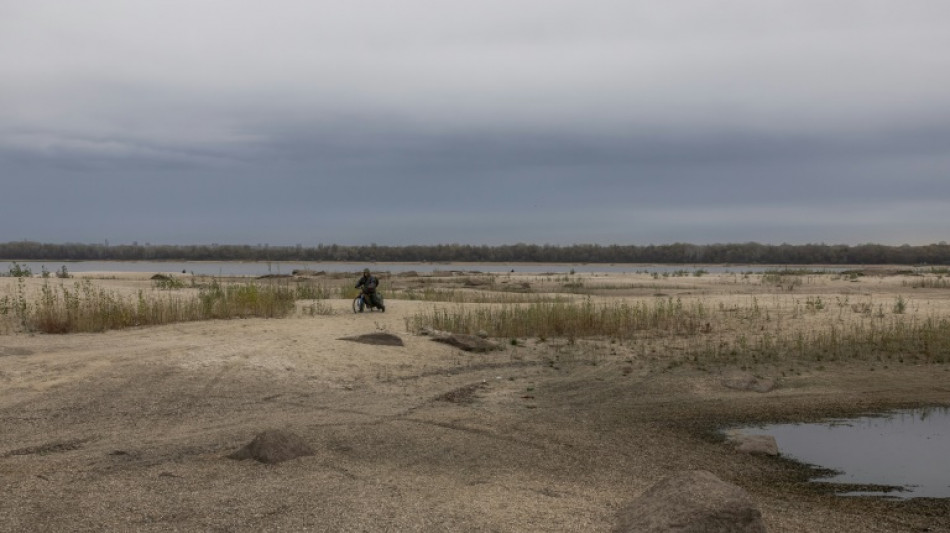
-
 Turkey's opposition says Erdogan's canal plan behind latest arrests
Turkey's opposition says Erdogan's canal plan behind latest arrests
-
Maresca hails 'nasty' Chelsea as top five bid stays alive

-
 Trump raises Putin doubts after Zelensky talks at pope's funeral
Trump raises Putin doubts after Zelensky talks at pope's funeral
-
Major blast at Iran port kills 4, injures hundreds

-
 Napoleon's sword to be sold at auction in Paris
Napoleon's sword to be sold at auction in Paris
-
Iran, US discuss nuclear deal in third round of talks

-
 Buenos Aires farewells native pontiff with call to action
Buenos Aires farewells native pontiff with call to action
-
Warholm sets hurdles world record at Diamond League, Holloway shocked

-
 US students 'race' sperm in reproductive health stunt
US students 'race' sperm in reproductive health stunt
-
Wikileaks founder Assange joins crowds for pope funeral

-
 Leader Marc Marquez claims Spanish MotoGP sprint victory
Leader Marc Marquez claims Spanish MotoGP sprint victory
-
Celtic win fourth successive Scottish Premiership title

-
 Jackson ends drought as Chelsea boost top five push
Jackson ends drought as Chelsea boost top five push
-
Warholm sets 300m hurdles world record in Diamond League opener

-
 Major blast at south Iran port kills 4, injures hundreds
Major blast at south Iran port kills 4, injures hundreds
-
Russia says retook Kursk from Ukraine with North Korean help

-
 Francis laid to rest as 400,000 mourn pope 'with an open heart'
Francis laid to rest as 400,000 mourn pope 'with an open heart'
-
Trump, Zelensky meet on sidelines of pope's funeral

-
 'Shared loss': Filipino Catholics bid Pope Francis farewell
'Shared loss': Filipino Catholics bid Pope Francis farewell
-
Families unable to reunite as India-Pakistan border slams shut
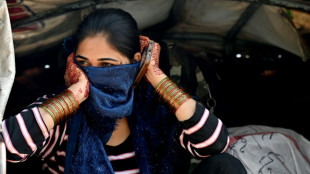
-
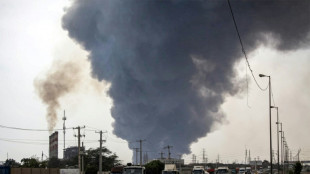 Major blast at south Iran port injures hundreds
Major blast at south Iran port injures hundreds
-
Foreign carmakers strive for 'China Speed' to stay in race

-
 Pakistan says open to neutral probe into Kashmir attack after India threats
Pakistan says open to neutral probe into Kashmir attack after India threats
-
Hundreds of thousands at funeral mourn pope 'with an open heart'
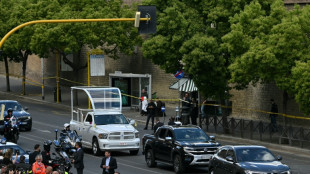
-
 Quartararo sets Spanish MotoGP record to claim pole
Quartararo sets Spanish MotoGP record to claim pole
-
Hamas says open to 5-year Gaza truce, one-time hostages release
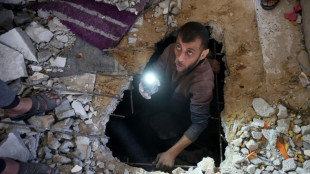
-
 Iran, US hold new round of high-stakes nuclear talks
Iran, US hold new round of high-stakes nuclear talks
-
Up at dawn for front-row seat to history at Francis's funeral

-
 Pakistan ready to 'defend sovereignty' after India threats
Pakistan ready to 'defend sovereignty' after India threats
-
Huge crowds flock to Vatican for Pope Francis's funeral

-
 Xi says China must 'overcome' AI chip challenges
Xi says China must 'overcome' AI chip challenges
-
Indian army says new exchange of gunfire with Pakistan

-
 Epstein accuser Virginia Giuffre takes own life in Australia: family
Epstein accuser Virginia Giuffre takes own life in Australia: family
-
Hundreds of buildings damaged, dozens injured in 6.3 Ecuador quake

-
 India and Pakistan's Kashmir fallout hits economy too
India and Pakistan's Kashmir fallout hits economy too
-
Francis's funeral to be grand farewell to 'pope of the poor'

-
 Pogacar faces defiant Evenepoel at Liege-Bastogne-Liege
Pogacar faces defiant Evenepoel at Liege-Bastogne-Liege
-
Chelsea eye great escape against Barcelona in Women's Champions League

-
 Iran, US to hold new round of high-level nuclear talks
Iran, US to hold new round of high-level nuclear talks
-
'Energy and effort' pay off for Reds as Blues' woes continue

-
 Albatross and closing birdie lift China's Liu to LPGA Chevron lead
Albatross and closing birdie lift China's Liu to LPGA Chevron lead
-
On the horizon? Wave of momentum for high seas treaty

-
 New to The Street Launches For The Causes(TM) Monthly Awareness Segments: Offering Free National Media to Charities and Organizations
New to The Street Launches For The Causes(TM) Monthly Awareness Segments: Offering Free National Media to Charities and Organizations
-
Top Mistakes to Avoid When Building Credit History

-
 Developing countries should fast-track US trade deals: World Bank president
Developing countries should fast-track US trade deals: World Bank president
-
Grizzlies' Morant 'doubtful' for must-win game 4 v Thunder

-
 Trump in Rome for pope funeral in first foreign trip of new term
Trump in Rome for pope funeral in first foreign trip of new term
-
Trump says Russia-Ukraine deal 'very close' after new Kremlin talks

-
 US rookies lead PGA pairs event with McIlroy and Lowry in hunt
US rookies lead PGA pairs event with McIlroy and Lowry in hunt
-
Trump tariff promises get a reality check


In flooded south, Ukraine builds landmark ecocide case against Russia
Stood in the cold air of a southern Ukrainian village, dozens of investigators were digging into the ground, collecting dirt, taking photos and planting small red flags in the soil.
Watching over the proceedings was Vladislav Ignatenko, a Ukrainian prosecutor conducting a world-first war crimes investigation into allegations of Russian ecocide.
The case, which Kyiv plans to take to the International Criminal Court (ICC) in some form, is the latest in a string of investigations and challenges that Ukraine hopes will hold Russia accountable -- and make it pay -- for its invasion.
The investigation in the southern Kherson region stems from the extensive flooding caused after the Kakhovka dam was partially destroyed on June 6 in a series of early morning blasts.
Dozens were killed as entire villages became submerged and the United Nations says there was $14 billion of destruction.
Ukraine says Russia blew up the dam and that the extent of the environmental damage constitutes a war crime.
To build its case, it has dispatched a hundreds-strong team of ecological investigators.
"We're going to use every possible method to gather evidence," Ignatenko, 32, told AFP.
Donning a military t-shirt and scrawling in a notebook, he called the hundreds working on the case "pioneers."
Russia has blamed Ukraine for the dam's destruction. Both sides have denied responsibility.
It was under Russia's control and the flooding complicated Ukraine's counteroffensive in the south.
The evidence collected in the village of Chornobaivka is just a small part of Kyiv's case.
"Our next point will be here, in this district of Kherson," Ignatenko said, pointing to a map.
"I'm not going there, it's too dangerous," one of his team protested.
The city has been under constant Russian shelling since Ukraine reclaimed it in November 2022.
- Polluted soil -
In Ukraine, ecocide -- deliberately destroying the natural environment -- is a specific criminal offence.
While the Rome Statute that underpins the ICC does not recognise "ecocide" as a crime in itself, its Article Eight states that large-scale environmental damage can be considered part of a war crimes case.
But the evidential barrier is high.
It must be proven that one side carried out an attack, that it knew it would cause "long-term and severe damage to the natural environment" and that the damage was "excessive" in relation to any perceived military advantage.
Ukraine is unperturbed.
Maksym Popov, a special adviser on environmental crimes to the Ukrainian Prosecutor General, has sent more than 400 prosecutors and investigators to gather evidence and Kyiv plans to prosecute Russia both at home and internationally.
Standing next to a row of houses, Ignatenko pointed to a mark on the wall above the ground.
"The water flooded this field... After conducting an analysis, we will be able to determine whether there are traces of pesticide or hydrocarbons -- polluted soil."
Flooding washed away petrol stations and farmhouses storing pesticides, raising concerns the land is now likely contaminated.
"When the water spilled out, it picked up pollutants and dumped them on land where farm animals were being kept," Ignatenko said.
For its case to succeed, Ukraine will first need to prove Russia blew up the dam.
"That's our conviction. Another investigation is underway to that end," the prosecutor said, as he packed a sample of earth into a plastic bag bearing the Ukrainian police logo.
On May 30 -- a week before the dam exploded -- Russia adopted a law banning the investigation of incidents concerning "hydraulic structures" in parts of Ukraine it claims to have annexed.
- 'Dynamic ecosystem' -
About 300 kilometres (185 miles) upstream, on the outskirts of Zaporizhzhia, biologist Vadym Maniuk walked across dry, crunchy ground.
Beneath his feet were millions of freshwater mussel shells, scattered across the old bed of the Kakhovka reservoir.
"There used to be four metres of water here," Maniuk, an associate professor at Dnipro's Oles Honchar University, told AFP.
"Billions of living organisms were killed suddenly, in a few days," when the reservoir emptied, Maniuk said.
To him, the charges of ecocide are undeniable given the scale of the disaster.
But almost six months later, life is returning, he said.
"We have regained a dynamic ecosystem in just a few months," he said.
The ground is strewn with shells and carp skeletons -- but goats have now taken to grazing on small shrubs.
Locals ride bicycles across the former waterway, weaving between boulders.
Biologists such as Maniuk are currently in a tussle with Ukraine's energy industry over whether to rebuild the dam.
"The scientists are against it, we're fighting against the energy lobby," he said.
It generated "negligible" power and a big reconstruction project would damage the local environment once more, Maniuk argued.
"The people here have already made the area their own. For shepherds and fishermen, the conditions are better."
Ch.Kahalev--AMWN



